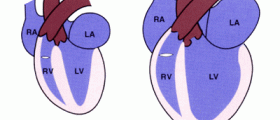
Cardiomyopathy is a term that refers to a group of heart diseases, all related to inadequate functioning of the heart muscle. In case of ischemic cardiomyopathy problems develops as a consequence of lack of oxygen supply due to improper blood flow through the heart arteries.
What Causes Ischemic Cardiomyopathy?
Ischemic cardiomyopathy develops due to insufficient blood flow through coronary arteries. The heart muscle does not receive optimal amount of oxygen and other necessary nutrients. Narrowing of these blood vessels is generally a consequence of atherosclerosis. This is why ischemic cardiomyopathy is most commonly associated with coronary heart disease.
The risk of ischemic cardiomyopathy is increased in specific groups of people. They include patients with high cholesterol levels, people with high-fat diet, patients suffering from hypertension, those with personal or family history of heart attack and obese people. Furthermore, a family history of coronary artery disease also increases chances for ischemic cardiomyopathy as well as other heart conditions. And finally, this type of cardiomyopathy is more frequent among patients suffering from diabetes, smokers and alcoholics.
Clinical Characteristics of Ischemic Cardiomyopathy
Patients suffering from ischemic cardiomyopathy generally develop symptoms and signs of angina or/and heart failure.
Symptoms and signs of angina include chest pain, dizziness/lightheadedness, heartburn, nausea and vomiting, palpitations, breathing difficulty (shortness of breath), fatigue etc. Symptoms and signs that point to heart failure are shortness of breath while lying down, sleeping or exercising, cough, fatigue, loss of appetite, pulse irregularities, swelling of the feet, ankles and abdomen.
Diagnosing Ischemic Cardiomyopathy
The doctor evaluates patient's medical history and performs a complete and thorough physical exam. Furthermore, the patient undergoes electrocardiography (EKG), echocardiography, chest X-ray, CT scan or MRI. Certain blood test are also important.
Treatment for Ischemic Cardiomyopathy
The goal of the treatment for cardiomyopathy is to improve heart function and prevent potential complications. There are several treatments and the doctor chooses the most convenient one according to severity of the condition. There is also chance of a combination of two or even more treatments.
The first thing such patients must do is change their lifestyles (eat healthy, exercise, quit smoking and drinking). Most of them require regular medicamentous therapy while only certain number undergoes surgery such as device implantation, coronary angioplasty or by-pass surgery. Medications prescribed to patients suffering from ischemic cardiomyopathy include Aspirin (prevention of blood clots), ACE blockers, aldosterone blockers, inotropes and anticoagulants. And finally, patients who do not respond to any of the mentioned treatments and whose heart becomes incapable of pumping blood require heart transplantation.

















Your thoughts on this
Loading...